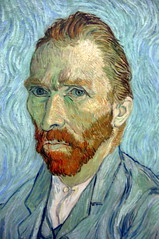Vincent Van Gogh's Portrait de l'artiste (Self-Portrait) was painted in Saint-Rémy-de-Provence in September 1889, says the Musee D'Orsay.
Like Rembrandt and Goya, Vincent van Gogh often used himself as a model; he produced over forty-three self-portraits, paintings or drawings in ten years. Like the old masters, he observed himself critically in a mirror.
Painting oneself is not an innocuous act: it is a questioning which often leads to an identity crisis. Thus he wrote to his sister: "I am looking for a deeper likeness than that obtained by a photographer." And later to his brother: "People say, and I am willing to believe it, that it is hard to know yourself. But it is not easy to paint yourself, either. The portraits painted by Rembrandt are more than a view of nature, they are more like a revelation".
In this head-and-shoulders view, the artist is wearing a suit and not the pea jacket he usually worked in. Attention is focused on the face. His features are hard and emaciated, his green-rimmed eyes seem intransigent and anxious. The dominant colour, a mix of absinth green and pale turquoise finds a counterpoint in its complementary colour, the fiery orange of the beard and hair. The model's immobility contrasts with the undulating hair and beard, echoed and amplified in the hallucinatory arabesques of the background.

No comments:
Post a Comment